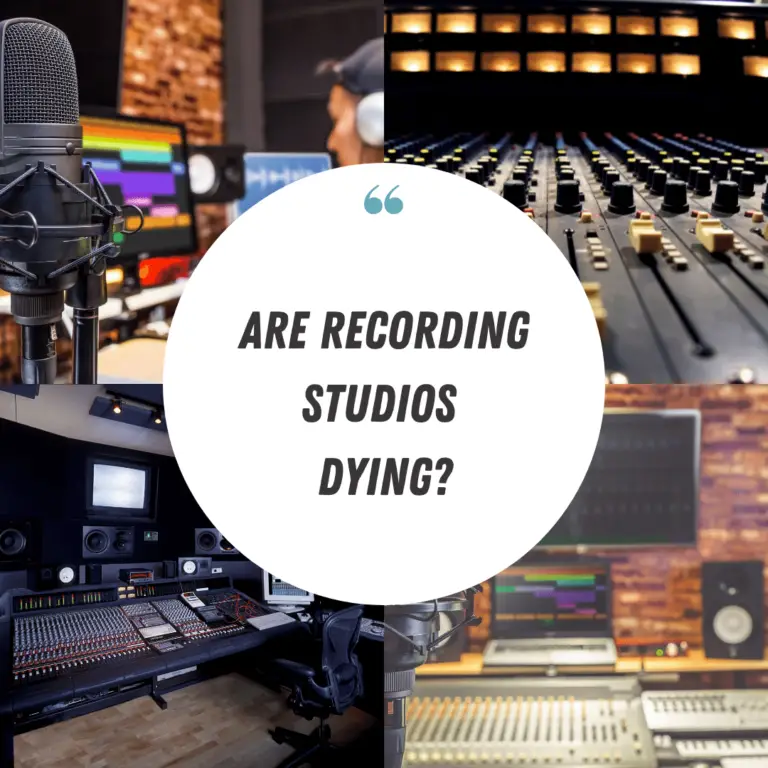There was a time not too long ago when anyone who wanted to make an album had to go through a recording studio. But with the advent of home recording software and affordable equipment, more and more artists are skipping the studio altogether. So is the recording studio dying? Let’s take a look at the pros and cons of each option.
In the face of ever-more accessible home recording technology, it’s a logical question. But while there are some facts supporting the notion that professional studio recordings may be on the decline, I’d say that both options still have plenty of life left in them. Let’s take a look at each.
First off, let’s talk about producing music at home. With today’s affordable and powerful equipment, making an album from your bedroom is easier than ever before. You can not only produce professional-sounding music with the right computer and software but you can even add all sorts of impressive production effects such as reverb and delay if you want to get super artsy with it. And when done right, home recordings can be just as clear and professional sounding as studio tracks.
But there are some disadvantages to recording at home too. For one thing, the convenience of home recording comes with a price tag. Unless you have really nice hardware and software, you’re probably going to need to invest some money into your setup before you can get started. If you don’t have that kind of spare cash lying around, then it’s probably best to stick with the pros for now.
Table of Contents
Is Recording Studio A Good Business?
Another thing to consider is that recording quality varies from person to person. If you’re not really familiar with the technical aspects of audio production, then it can be hard to get a great sound out of your bedroom studio. And even if your music does end up sounding good enough for radio play, you certainly won’t stand out against most professional albums released by big-name artists.
Add all these factors together and I’d say home recording has its definite advantages but isn’t quite ready for primetime yet.
On the other hand, recording in a studio still has plenty going for it too. For one thing, studios come equipped with professional-grade equipment which means you’ll get superior sound quality automatically (unlike at home where you might have to spend a lot of money on gear first).
Plus, you’ll have access to highly-skilled engineers and producers who can help take your music to the next level. And since most studios also offer their services as a package deal, they can usually hook you up with industry contacts and other resources that could really boost your career.
So while home recording isn’t quite ready to replace studio recording just yet, it’s definitely become a viable option for many artists and should continue growing in popularity over the years. So why settle for one when you can have both?
What Is The Future of Recording Studios?
So while it’s true that home recording is on the rise, I wouldn’t count out the professionals just yet. If anything, I think we’ll see more and more artists taking advantage of both methods for different purposes. Some artists will stick with the pros for their studio recordings while others will choose to do it themselves. So don’t be surprised if you see both options continuing to thrive side-by-side in future years.
So while recording studios aren’t quite 100% safe from technology, I’d say that they’re still here to stay for quite a while longer. Either way, every artist should seriously consider getting at least some of their music recorded in a professional studio.
“Is Your Home Studio Dead?”
I think recording studios are dying because of musicians, not technology or home recording setups. Musicians have been spoiled for decades by the lack of investment required to make a passable demo and release it on labels with an expectation of massive returns on their investments. The democratization of creativity has given rise to more mediocre artists than ever before and the internet has made it easier than ever before for them to be discovered by record companies looking for a cash cow.
Musicians are not investing in their craft or working hard to make the best possible product they can because it’s easier to move units by copying trends, releasing mediocre music, and pandering to audiences rather than challenging them with new content.
The return on investment for record labels is decreasing rapidly as well – recording studios are absolutely necessary for high budget productions but provide diminishing returns with increasing budgets, while artists are increasingly less willing to promote themselves which makes any costs incurred by promotion exponentially more wasteful. The middle-ground artist that would have been nurtured over years of development are now given a few weeks of studio time before being dropped into a vast ocean filled with eager turning piranhas looking for dinner.
Is A Recording Studio A Good Investment?
So while it’s true that recording studios are getting less return on their investments, I don’t think it means they’re doomed to extinction. If anything, the future of these businesses will likely look a lot different than the present.
For one thing, you’ll see more artists taking advantage of home recording setups rather than shelling out the dough for studio time. So instead of buying brand new equipment, I’d expect recording studios to start acquiring this gear at discounted rates as musicians upgrade instead of upgrading themselves. That way, studios can still offer cutting-edge technology without breaking the bank.
Plus, there’s also a growing demand for hybrid production houses that provide both studio and home recording options under one roof. This is especially true for bands who may want to record their album themselves but then bring it into a studio for mixing and mastering.
I’d also expect an increase in the amount of custom and exclusive contracts offered by artists, labels, and managers (especially for clients that provide label-level investment) as well as an uptick in visual media like album covers, music videos and short films. At the end of the day, not everything has to be about selling units which will make studios more diverse rather than less.
So while you may see home recording setups taking away some business from recording studios over time, I don’t think we’ll ever see them completely replace traditional facilities because there’s just too much value in having access to someone with experience producing music under professional conditions. Plus, high-quality performance recordings provide a level of flexibility that can’t be achieved at home.
How Much Should You Spend On A Home Studio?
One of the biggest concerns of musicians is trying to find a balance between spending too much money on equipment and not having enough resources to do your best work.
For getting started, you can expect to spend anywhere from $1,000 – $5,000 for an entry-level home studio consisting of acoustically treated rooms, quality microphones, and interfaces along with high-quality monitors. While this kind of gear may seem expensive at first glance, it’ll enable you to make professional recordings in a way that will be cost-prohibitive in a traditional studio setting.
If you’re looking for more functionality or higher fidelity results, then I’d recommend investing between $10,000 – $20,000 depending on the equipment you want to get and the quality you’re looking for.
If budget isn’t an issue, home studios can actually be designed to rival or even surpass traditional studio setups in terms of performance, though it will likely cost more money to get there (but not necessarily less than what you would pay elsewhere).
However, I think one thing is clear – if your goal is getting top-notch results with a minimal budget then going the home recording route is going to be extremely difficult. While these resources may have been sufficient a few years ago when production quality was lower, the higher bar that consumers set today means that you’ll need a lot of money just to keep up with everyone else in a competitive market.
But don’t give up hope yet! There are still plenty of ways to cut corners and get great results without leaving a hole in your wallet. Plus, with the right mindset and some elbow grease, you can really push these resources to their fullest potential and create something amazing for you and your fans.
Conclusion
The truth is that with or without a home studio, there will always be a place for recording studios in the world of music production. After all, not everyone can afford to buy their own high-end recording equipment and even if they could, it doesn’t mean they’d know how to use it with professional results. Plus, you can have great ideas but still need someone else’s skills to bring them into the real world.
In other words – home recording may be able to do some things better than a traditional studio setting but you’ll never achieve the same level of results with this kind of setup alone. In fact, it doesn’t make sense for people who want really good quality recordings because this would involve having to spend thousands more on a professional setup.
So if you have the money, the space, and the know-how, studio recording is probably worth it if your goal is to achieve a high level of quality in your work. This doesn’t mean home studios are dead by any stretch of the imagination, but they’re definitely not an equal replacement for traditional setups either.

